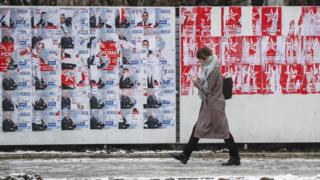Facebook shuts Moldova election accounts
Facebook says it has removed more than 200 “inauthentic” accounts targeting people in Moldova, some of which were linked to government employees.
Moldovans go to the polls on 24 February under a new electoral system.
One of Europe’s poorest countries, it is politically split between pro-Western and pro-Russian factions.
Facebook said the accounts posted about divisive political issues, shared manipulated photos, and impersonated a local fact checking-organisation.
It said 168 accounts, 28 pages and eight Instagram users had been removed. But unlike allegations of election interference in the United States, the activity came from within Moldova, it said.
“Although the people behind this activity attempted to conceal their identities, our manual review found that some of this activity was linked to employees of the Moldovan government,” the social network said in a statement.
Why is Facebook suddenly interested in Moldova?
Moldova’s upcoming parliamentary elections have already resulted in a number of controversies.
The country is sandwiched between the European Union and Ukraine. Its government has been pursuing a pro-EU stance for the last several years, while its president was elected on a pro-Russia platform.
The two sides do not see eye-to-eye, with President Igor Dodon having been suspended multiple times for refusing to sign laws passed by parliament.
Going into the election, he has been told by the country’s national electoral commission not to show public support for his own party, the Socialists, saying the president must remain impartial.
In turn, Mr Dodon has labelled that decision “illegal and ungrounded” and gone to court over it.
And the new electoral system – half of the 101 MPs will be elected on party lists, half in single-seat constituencies – will favour the large established parties, critics say.
At a time when relations between the West and Russia are strained, foreign powers have also issued warnings over Moldova’s vote.
The US ambassador delivered a speech calling on Moldovans “to choose a bright, prosperous, and democratic path”.
Russia has accused the US of meddling in the election, saying local are being “threatened with the severance of ties with the West”.
That echoes accusations of the liberal party, who say that the president’s pro-Russian stance “is blackmailing citizens by saying that Moldovans will have good relations with Russia only if they vote for the Socialists”.
Why is Facebook targeting misinformation?
In the wake of the 2016 US presidential election, it emerged that fake accounts from abroad had aimed to spread misinformation on social media.
Despite a lack of evidence that it had influenced the outcome, Facebook found itself under pressure to combat the spread of political messages online from people who may not be who they appear to be.
Facebook called this co-ordinated inauthentic behaviour: “when groups or pages or people work together to mislead others about who they are or what they’re doing”.
“When we take down one of these networks, it’s because of their deceptive behaviour – it’s not because of the content they’re sharing,” the company says.
In Moldova, page administrators posted about local news and political issues – including sensitive topics such as the possibility of mandatory Russian or English language education, or the idea of reunification with Romania.
About 54,000 people followed at least one of the pages, Facebook said.
“We are constantly working to detect and stop this type of activity because we don’t want our services to be used to manipulate people,” Facebook said.
In recent months, it has taken similar action in Indonesia, Iran, and Russia, and has banned violent or military groups in Myanmar.
Source: Read Full Article



